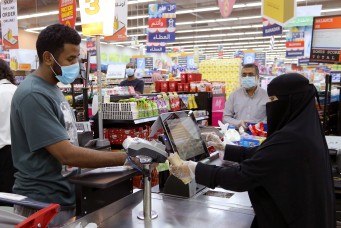Cairo’s Crude Crisis
Cheap oil is hurting Egypt’s economy in the short term and could have wider political consequences.
Low oil prices are heaping added pressure on Egypt’s currency crisis. While common wisdom holds that the finances of fuel-importing nations, such as Egypt, stand to benefit from declining energy prices, the net impact for Cairo’s economy is surprisingly negative. At least in the short term, this trend is exacerbating what was already a full-fledged foreign currency crisis as a result of significant falls in tourism and industrial exports revenues.
In the long run, Egypt should benefit from cheaper oil by spending less on importing and subsidizing gasoline and gas. Indeed, spending on petroleum and natural gas subsidies has decreased from 73 billion Egyptian pounds ($8.2 billion) in 2014–2015 to 55 billion ($6.2 billion) in 2015–2016. This is at least partially due to plummeting oil prices, which may eventually have a positive impact on inflation and allow Egypt to overcome four years of energy shortages. All in all, this may actually be conducive to future economic growth.
Yet there are a number of reasons why depressed oil prices are hurting the Egyptian economy in the shorter term. First, as Egypt’s single biggest export, petrochemicals constitute one of its main sources of U.S. dollars. For a country as dependent on imports as Egypt, access to foreign currency (particularly dollars) is crucial. Egypt is earning fewer dollars from its energy exports, partly due to lower energy prices. Inability to pay energy firms their dues in dollars is also contributing to a declining domestic energy production and, therefore, energy-related dollar revenues. Amid low energy prices, these companies are also curtailing their exploration activities, limiting Egypt’s future production and withholding precious dollars from the local market. According to statistics from the Ministry of Trade and Industry, Egypt’s exports of crude oil and petrochemicals declined 33 percent from $4.5 billion in between January 2014 and September 2014 to $3 billion in the same period of 2015. While more recent figures have not been released, it is likely that this revenue decline has accelerated due to the continued weakening of energy prices. Meanwhile, the country is paying more dollars for energy imports. Egypt’s imports of crude oil and petrochemicals rose in that same time period of January to September 2014 from $6.3 billion to $8.8 billion in 2015, partly because of declining energy grants, credits, and aid from the Gulf.
Second, low oil and gas prices are substantially limiting aid from the Gulf countries, Egypt’s main economic lifeline since the July 2013 military coup. Although it is probable that there are also geopolitical reasons behind declining Saudi and Emirati aid and investments in Egypt, such as Cairo’s pro-Russian stance in Syria and reluctance to send combat troops to Yemen, both Gulf countries continue to support the military regime in an effort to curb growing Iranian influence in the Middle East. Their commitment is more constrained by diminishing oil and gas revenues and the sharp costs of war in Syria and Yemen. Saudi Arabia’s budget deficit expanded from 2 percent of its GDP in 2014 to 15 percent one year later, and foreign reserves plummeted from $737 billion in to $640 billion. As such, assistance to Egypt has sharply declined. While Gulf aid and permissive loans for the Egyptian fiscal budget for July 2013–June 2014 are estimated to be at least $16.7 billion, such assistance plummeted to single digits in the period thereafter, and recent pledges are meager in comparison and lack a strict timeframe.
In February, Saudi Arabia rejected the Egyptian government’s project proposals that would have brought in $8 billion in Saudi investment. Likewise, Emirati contractors limited their participation in Abdel Fattah El-Sisi’s signature projects to build affordable housing and a new administrative capital. The financial pressure these countries feel as a result of oil that sells for approximately $30 per barrel will lead them to reject former blank-check forms of assistance and potentially opt instead for opportunistic investments, such as in the lucrative real estate sector. To be sure, Riyadh has recently hinted at further aid to Egypt, particularly in the energy sector, but this aid is far less generous than in previous years. Osama Kamal, Egypt’s former Minister of Petroleum, recently warned that Saudi Arabia cannot afford to invest in Egypt at the current oil prices.
Third, as oil-producing Gulf countries face their own economic challenges, remittances sent home by Egyptians working in these countries are plummeting. While Cairo’s banks received $22 billion in transfers in 2014, that figure declined to $18 billion in 2015. This is attributed to the Gulf economies’ stagnation and limited austerity measures, as well as the large discrepancy between the Egyptian official exchange rate and that of the black market.
Finally, cheap energy prices are limiting Egypt’s access to foreign currency via the Suez Canal. According to a report by SeaIntel, cheaper oil and cheaper fuel has already pushed many maritime cargo ships to take the longer route around the Cape of Good Hope instead to avoid the now uneconomical canal tariffs. Between October 2015 and the new year, 115 ships have already taken the longer, but now cheaper, route. More ominously, the commodity sector’s global decline has thus far been due to oversupply. If demand also declines due to a slowdown in the Chinese economy or emerging market credit problems, Egypt stands to lose even more dollars from the contraction in international maritime trade, on top of diminishing oil and LNG cargo revenues.
This foreign currency crisis—exacerbated by low energy prices—has broad social, economic, political and geostrategic implications for Egypt. On the socioeconomic front, Egypt faces a growing need to borrow from the International Monetary Fund, which will give it little choice other than to embark on a painful array of structural reforms, austerity measures, and currency devaluation. These will pass tremendous costs to Egypt’s already strained consumers. The current inflation level of approximately 10 percent is likely to increase while the economy slows and jobs become scarcer. Additionally, cutting public spending by taking on the country’s bloated bureaucracy has proven no easy task, as the government confronts a powerful lobby of public employees numbering—according to divergent Egyptian government estimates—between 5 and 7 million. For instance, in January parliament reviewed hundreds of laws that President El-Sisi had passed in 2015, but the only one they struck down was the civil service law, which would have substantially curtailed hiring in the public sector and effectively frozen wages.
The current currency crisis will hit Egyptians across the board. Unusual shortages and price hikes in staples such as rice, cooking oil, and medicine are spreading. Some companies—including General Motors, LG, Air France, British Airways, and Italcementi—have either suspended operations temporarily or considered exiting the market entirely, due to their inability to repatriate earnings or access dollars needed for imports. The government’s recent decision to increase tariffs on a host of imported products to limit the pressure on the Egyptian pound highlights the impact of the dollar problem on manufacturers, importers, workers, and customers alike.
On the political front, President El-Sisi faces the seemingly contradictory challenge of managing the country’s finances while simultaneously forestalling and suppressing manifestations of public unrest. Given the rapid decline in Egyptians’ living standards and welfare benefits, outbursts of public anger may begin from professional syndicates, labor unions, and even government employees. Should these groups openly defy the regime’s security forces, they may quickly be joined by a host of other groups and ordinary citizens. This is already happening with the Egyptian Medical Syndicate, Alexandria bus drivers, Cairo taxi drivers, and labor unions in Alexandria and the Nile Delta. Public criticism of the president and the government, a taboo since El-Sisi came to power, is becoming common on media channels considered close to state institutions. In short, given the economic outlook, Egypt is likely to suffer from disruptive sociopolitical turmoil that will dampen hopes for political stability and further impede the government’s ability to turn the economy around.
This article is reprinted with permission of Sada. It can be accessed online here.
Yasser El-Shimy is a senior teaching fellow at Boston University and the former Egypt analyst for the International Crisis Group. On Twitter @underreported.



